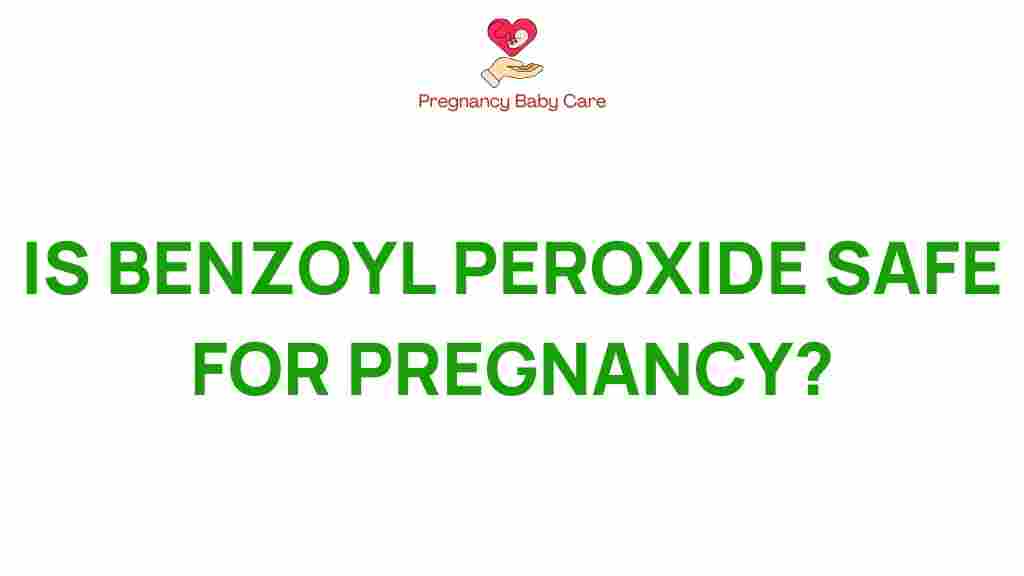The Safety of Benzoyl Peroxide During Pregnancy: What You Need to Know
Pregnancy is a beautiful journey, but it can also come with its share of challenges, including skin issues such as acne. Many expectant mothers may be curious about the safety of various skincare ingredients, particularly benzoyl peroxide. This article will explore the safety of benzoyl peroxide during pregnancy, examining its use in dermatology, potential health risks, and the best practices for skincare during this crucial time.
Understanding Benzoyl Peroxide
Benzoyl peroxide is a common ingredient found in many over-the-counter acne treatments. It works by killing acne-causing bacteria, unclogging pores, and reducing inflammation. While it is an effective acne treatment, the concern arises when considering its use during pregnancy.
Pregnancy Safety and Dermatology
When it comes to pregnancy safety, dermatologists often recommend caution with certain skincare ingredients. The skin can react differently during pregnancy due to hormonal changes, making it essential for expectant mothers to choose skincare products wisely. Here’s what you need to know about benzoyl peroxide:
- Concentration Levels: Benzoyl peroxide is available in various concentrations, typically ranging from 2.5% to 10%. Lower concentrations are often recommended for pregnant women.
- Topical Use: Most studies suggest that topical application of benzoyl peroxide is generally considered safe during pregnancy, particularly when used in moderation.
- Systemic Absorption: The amount of benzoyl peroxide absorbed through the skin is minimal, which reduces the likelihood of adverse effects on the fetus.
Health Risks Associated with Benzoyl Peroxide
While benzoyl peroxide is predominantly regarded as safe during pregnancy, there are some potential health risks and considerations for expectant mothers:
- Skin Sensitivity: Pregnancy can make your skin more sensitive. Benzoyl peroxide can cause dryness or irritation, so it’s crucial to monitor your skin’s reaction.
- Allergic Reactions: Some individuals may develop an allergy to benzoyl peroxide. If you notice redness, swelling, or itching, discontinue use immediately and consult a healthcare professional.
- Consultation with a Dermatologist: Always consult with a dermatologist or healthcare provider before starting any new skincare regimen during pregnancy.
Step-by-Step Guide to Using Benzoyl Peroxide Safely During Pregnancy
If you’ve decided to incorporate benzoyl peroxide into your skincare routine while pregnant, follow these steps to ensure you do so safely:
- Consult Your Doctor: Before using benzoyl peroxide, speak with your healthcare provider or dermatologist about your specific skin needs.
- Choose the Right Product: Opt for a lower concentration of benzoyl peroxide (2.5% is generally recommended) and select a topical formulation rather than oral medications.
- Patch Test: Apply a small amount of the product to a discreet area of skin to check for any adverse reactions before applying it to your face.
- Apply Sparingly: Use benzoyl peroxide only on affected areas and avoid overuse to minimize skin irritation.
- Moisturize Regularly: Since benzoyl peroxide can cause dryness, follow up with a gentle, hydrating moisturizer suitable for sensitive skin.
- Monitor Your Skin: Keep an eye on how your skin reacts. If you experience significant irritation or discomfort, discontinue use and consult a dermatologist.
Alternative Skincare Ingredients for Expectant Mothers
If you are hesitant about using benzoyl peroxide during pregnancy, consider these safe alternatives for acne treatment:
- Salicylic Acid: While high concentrations should be avoided, low concentrations can be safe for use.
- Azelaic Acid: A natural acid that helps reduce acne and is considered safe during pregnancy.
- Glycolic Acid: This alpha hydroxy acid can help exfoliate and improve skin texture without significant health risks.
Common Troubleshooting Tips for Acne During Pregnancy
Managing acne during pregnancy can be challenging. Here are some tips to help you navigate this issue:
- Stay Hydrated: Drink plenty of water to keep your skin hydrated and promote overall health.
- Follow a Gentle Routine: Use a mild cleanser and avoid harsh scrubs that can irritate your skin further.
- Eat a Balanced Diet: Incorporate fruits, vegetables, and omega-3 fatty acids into your diet to support skin health.
- Get Enough Rest: Sleep is crucial for your body and skin. Aim for 7-9 hours of quality sleep each night.
- Avoid Picking: Do not pick at acne, as this can lead to scarring and worsen inflammation.
Conclusion
In conclusion, benzoyl peroxide can be a safe option for expectant mothers dealing with acne when used correctly and in moderation. Always consult with a healthcare professional to ensure that your skincare routine aligns with your specific needs during this critical time. Remember to prioritize your skin’s health by choosing gentle and effective ingredients and maintaining a balanced lifestyle. For further reading on skincare during pregnancy, you can check out this resource.
As you embark on your journey of motherhood, taking care of your skin is just as important as caring for your growing baby. Stay informed, cautious, and proactive in your skincare choices, and you will navigate pregnancy with confidence.
For more information on safe skincare ingredients during pregnancy, visit this helpful guide.
This article is in the category Health and created by PregnancyBabyCare Team
